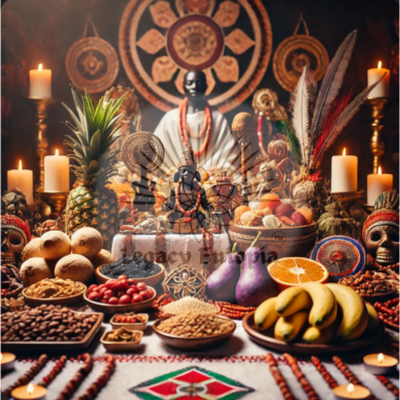Do Orishas Need Food?
If Orishas Are Spiritually Strong, Why Do They Need Food?
Do Orishas need food? Here’s why offerings are still significant, even though Orishas are seen as powerful: The idea of Orishas needing food, despite being spiritually strong, is rooted in the symbolic and relational nature of Yoruba religious practices.

A Deep Dive into Yoruba Spirituality
Core Beliefs of Alaafia Eboriru
Differences Alaafia Eboriru vs Yoruba
Alaafia Eboriru Specific Rituals
Do Worshippers Believe Orishas Consume Food?
Why Are Food Offerings Made to Orishas?
Are Food Offerings Needed? ( you are here)
The concept of offering food is not about the Orishas being weak or dependent on physical sustenance, but rather about maintaining balance, reciprocity, and connection between the human and spiritual realms.
1. Reciprocity and Relationship Building
In the Yoruba belief system, the relationship between humans and Orishas is based on reciprocity. Just as humans seek blessings, guidance, and protection from the Orishas, they also need to give something in return. Offerings of food serve as a way to maintain this mutual relationship. The act symbolizes respect and gratitude, not that the Orishas lack power or strength.
2. Symbolic Nourishment
The food offerings represent a symbolic exchange of energy rather than a necessity for physical sustenance. Although the Orishas are spiritually strong, the offerings of food are part of rituals designed to honor them and strengthen the spiritual connection. The offerings reinforce the flow of ase (spiritual energy) between the human world and the divine, keeping the relationship in balance.
3. Maintaining Cosmic Order
In Yoruba cosmology, humans, nature, and the Orishas are all interconnected. Offerings are a way of maintaining harmony within the universe. By giving food, worshippers acknowledge their part in the cosmic order and demonstrate their willingness to keep that balance intact. The offering is more about respecting the structure of the spiritual world rather than fulfilling a need for the Orishas themselves.
4. Expression of Devotion
Food offerings are also a form of devotion and ritual practice. The Orishas don’t need food in a literal sense, but receiving these offerings is an act of worship that shows the devotee’s commitment and reverence. It’s a symbolic gesture that reinforces the worshipper’s connection to the divine, akin to how humans might give gifts to express love or loyalty.
5. Maintaining the Cycle of Exchange
Yoruba cosmology is built on the idea of exchange—humans provide offerings, and the Orishas offer blessings, protection, and guidance in return. This exchange isn’t based on weakness or dependence but on keeping the cycle of spiritual energy and blessings flowing smoothly. The offerings are a part of this spiritual economy.
6. Cultural and Ritual Significance
The rituals of offering food also have cultural and community significance. They bring people together in ceremonies, encourage reflection, and help strengthen communal bonds. Even though the Orishas are powerful, the act of offering food is more about maintaining tradition and engaging in meaningful spiritual practice.
In essence, the offering of food is a way for humans to participate in the sacred relationship with the Orishas, not because the Orishas are in need, but because it fulfills the spiritual principles of reciprocity, balance, and respect.
SpiritFairie Whispers on Youtube
